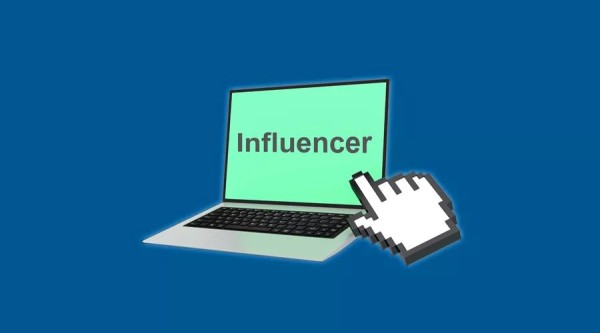
◆ ◆ ◆ ◆
The Increasing Influence of
the Word ‘Influencer’
influencer一词的影响力日益增强
◆ ◆ ◆ ◆
By Rebecca Juganaru
Good or bad, there is no denying the influence social media has on many of our lives—a fact that has not escaped the notice of marketers around the world. This has seen the rise of a new type of marketing: the influencer. An influencer, in this specialized use, refers to ‘a person with the ability to influence potential buyers of a product or service by promoting or recommending the items on social media’, particularly when they do so in exchange for money or for samples of the product they are promoting.
不论好坏,社交媒体对我们很多人的影响不可否认——这是世界各地的营销人员已经注意到的事实。一种新型营销已经兴起:the influencer。在这种特定用法中,influencer指“在社交媒体上有能力通过推广或推荐来影响潜在用户购买产品或服务的人”,尤其当他们推广某产品是为了挣钱或获得产品样品。
【Influencer直译为“影响者”,根据以上定义,近似于流行语中的明星“带货”、产品的“意见领袖”。】
This is the next step in celebrity endorsement, but the celebrity need not be a household name; instead they may simply be someone with a large following on social media, allowing news of a particular product to reach a wide audience directly, whose opinion will be valued and trusted. The effect of influencers in the market is unquestionable, with Snapchat stock losing $1.3million, a drop of 6%, after a single negative tweet by celebrity influencer Kylie Jenner. This new marketing trend has led to a dramatic increase in the use of the word; in 2017, the number of hits for influencer each month in our new words corpus was typically more than double that of five years ago, in 2012.
这也是明星代言的下一步,不过这种名人不必家喻户晓;相反,他们或许只是在社交媒体上拥有大量粉丝,可以让特定产品的信息直接传播给广泛受众,而受众会重视和信任他们的观点。影响者对市场的影响毋庸置疑,例如,“影响者”电视明星凯莉·詹纳不过在推特上哀叹了一句色拉布不好用,就造成该公司股票下跌6%,损失130万美元。这种营销新趋势使得influencer一词的使用急剧增加:2017年,在牛津新词语料库中,influencer的月点击量比五年前(2012年)增加了一倍多。
sooo does anyone else not open Snapchat anymore? Or is it just me… ugh this is so sad.
— Kylie Jenner (@KylieJenner) February 21, 2018

This sudden rapid increase in use put a seemingly simple derivative onto our lexicographers’ radars and we defined influencer on Oxford Dictionaries last year, with the entry covering both its original general sense and the new sense responsible for its huge rise is usage. However, while the marketing sense of influencer is undeniably new, the word itself has a much longer history than some might guess. The Oxford English Dictionary’s research has so far found usage of influencer (in the more general sense of ‘a person or thing that influences another’) dating all the way back to the 1660s, when Henry More referred to ‘The head and influencer of the whole Church’.
这种使用量激增在牛津词典编纂者看来就是增加了一个看似简单的衍生词。在去年的牛津词典中,我们重新定义了influencer一词,新词条涵盖了它的原始常用义以及引起用量大增的新义。然而,尽管influencer含有的营销意义无疑是新的,但该词本身的历史却比一些人可能想到的长得多。到目前为止,《牛津英语词典》的研究发现,influencer的使用(常用义“影响他人/物的某人/物”)可追溯至1660年代,当时,亨利·摩尔提到“The head and influencer of the whole Church(整个教会的领袖和影响者)”。
In over three hundred years, we have seen a great deal of change in the way influencer is used. Our language data shows that influencer now often appears in compounds. As well as demonstrating the platform used—with combinations such as social-media influencer, Instagram influencer, YouTube influencer, and Vine influencer proving to be amongst the most common—we are also seeing influencer modified to indicate scale, for example in micro-influencer, uber-influencer, super-influencer, and mega-influencer. This sort of linguistic innovation shows the extent to which the word has become integrated into normal language use.
过去300年,我们已经看到influencer的用法发生了很大变化。牛津的语言数据显示,influencer一词现在经常以复合词形式出现:一类组合展示出使用平台,如social-media influencer、Instagram influencer、YouTube influencer和Vine influencer等都是最常见的组合;还有一类是将influencer用作修饰语,表示影响范围,如micro-influencer、uber-influencer、super-influencer和mega-influencer。这种语言创新表明了该词融入日常语言使用的程度。
In fact, the innovation even goes one step further: -fluencer is starting to become a productive suffix on its own, appearing in new blended words like thinkfluencer, Pinfluencer, fitfluencer, techfluencer, and manfluencer. Though each of these words individually is still quite rare, together they form strong evidence of -fluencer’s growing frequency as a combining form.
事实上,创新甚至更加深入:-fluencer本身已开始成为一个多产的后缀,出现在一些新的混合词中,如thinkfluencer、Pinfluencer、fitfluencer、techfluencer和manfluencer等。尽管这些新混合词的单个使用量还很小,但在一起就形成了有力的证据,证明-fluencer以组合形式出现的频率正在增加。

Of course, being in common use does not always correlate with being perceived in a positive light. So far, much of the linguistic data around influencer is practical—detailing location, size, and topic. However, we are also starting to see some associations between influencer and more negative and devaluing terms such as wannabe and so-called. As the conversation around social media is coloured by negative news stories relating to privacy concerns, we may see this have an impact on how the influencers who use this as their platform are perceived.
当然,日常使用该词并不总是与积极意义相关联。到目前为止,很多有关influencer的语言学数据都是实用性的——详细说明位置、大小和主题。然而,我们也开始看到influencer与更多消极和贬义的词汇之间发生关联,比如wannabe(名人的崇拜模仿者)和so-called(所谓的)。由于围绕社交媒体的讨论被隐私问题等相关负面新闻报道所歪曲,人们对那些以此为平台的influencer的看法会受到怎样的影响,我们或许就可以看到了。
When we document the rise and fall of a word, it is important to track not only its frequency, but also changes in how that word is perceived; on rare occasions, these changes may make it necessary to update how the word is defined or to the types of examples of usage that we give. For example, when snowflake was first applied to a person, it typically was used only to call them unique (building on the idea that no two snowflakes are exactly identical). However, in a short span of time the word snowflake came to mean something much more derogatory, carrying connotations of being oversensitive and acting as though entitled to special treatment. With the storm of negativity surrounding social media, it is possible that related terms like influencer may be headed the same way.
当我们记录一个词的兴衰时,不仅要追踪它的使用频率,还要追溯它是如何被感知使用的,这很重要;在极少数情况下,这些变化可能导致必须更新这个词的定义或之前给出的用法示例类型。例如,当snowflake(雪花;独特的;雪花男)一词首次用来描述一个人时,(基于没有两片雪花是完全相同的理念,)通常只表示“独特的”。但是,很快,snowflake一词开始表示更具贬义的东西,带有过分敏感的意味,好像被赋予某种特殊待遇。鉴于社交媒体上充溢着各类负面情绪,像influencer这样的词很有可能走上同一条路。
(文字整理自“牛津词典”,图片来自网络)
 返回搜狐,查看更多
返回搜狐,查看更多

